The Daily Agenda: Sheriff showdown
Nearly 200 people turned out Monday to hear from sheriff and county attorney candidates ... Today, we break down what candidates for Pima County’s top cop had to say ... Budgets everywhere.
Donna Liggins Recreation Center was the place to be Monday night, with around 200 community members turning out to hear from all seven candidates vying to become Pima County’s top cop or prosecutor.
The forum, co-hosted by the NAACP Tucson branch, League of Women Voters of Greater Tucson, Interdenominational Ministerial Alliance and the Tucson Alumnae Chapter of Delta Sigma Theta, was anything but boring. Several candidates took pointed shots at their opponents and the crowd was vocal in their praise and disappointment, despite pleas from the moderator to stay quiet.
Candidates fielded questions for nearly two hours and since Substack limits the length of our emails, we’ll be reporting on the event in two parts.
Today, we’re focusing on sheriff candidates and next week we’ll dive into the county attorney portion of the forum.
Over the last month, we’ve published interviews with three of the candidates for sheriff (Heather Lappin, Bill Phillips and Sandy Rosenthal) and while forum questions touched on a lot of the issues that we already covered, there was plenty of new information.
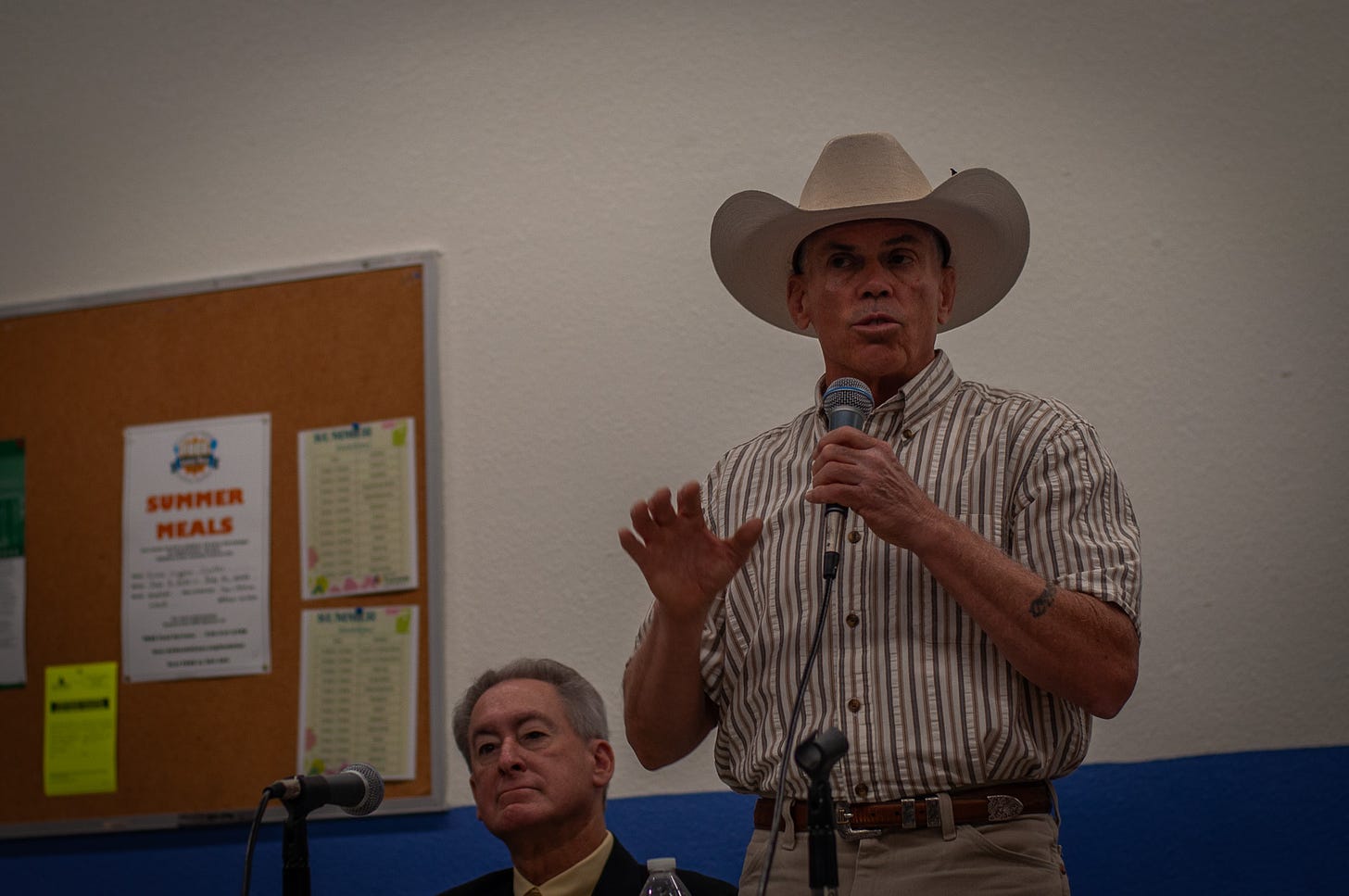
Addressing racial disparities in the criminal justice system
Republican candidate Terry Frederick didn’t provide a straightforward answer to the question, saying that he had contact with people of all races when he was growing up in Ohio and always treats people with respect.
Lappin said that department-wide training is the key to addressing the law enforcement side of the disparities and that she added a class to the department’s advanced officer training academy about implicit bias. She also brought in a speaker to talk to deputies and corrections officers about issues affecting the community.
“I think the most important thing we can do as leaders is have a seat at a table where we can listen to uncomfortable things that might make us better,” she said, promising to do that.
Sheriff Chris Nanos touted his work with the NAACP, saying he's partnered with the NAACP since he first became sheriff and has authored letters and promoted their efforts on various reform issues, including abolishing the cash bail system, incorrectly identifying NAACP Tucson Branch President Dr. Cheree Meeks as “Dr. Cheeks.”
Phillips said the way to work on bias issues is to send police into neighborhoods to get to know the people there and work with youths. He said that part of his platform is creating a reserve system and sending more deputies into the field to help understand Pima County’s neighborhoods.
Rosenthal fell back on his military history, saying that when he was serving in the Army, “we all bled the same color” and everyone was one team, working together.
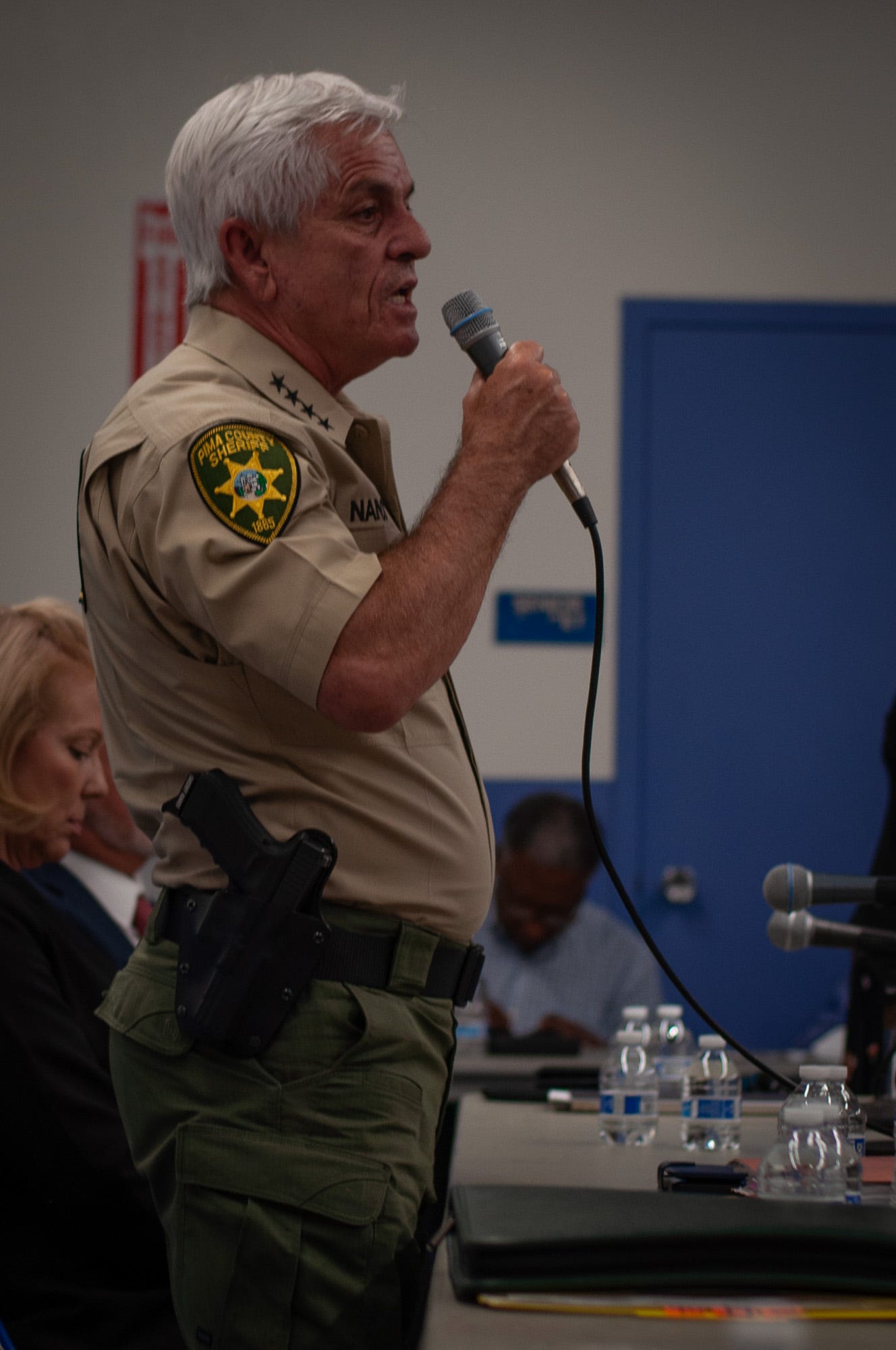
Diversifying the department’s leadership team
Rosenthal pointed out that no women had applied for a promotion during the last round, saying that the lack of diversity on the command staff and in leadership positions is one of the department’s failures. He said it’s important to make sure the department mirrors the community and that the way to ensure a diverse employee group is to hire and promote accordingly.
The first step to increasing the number of women at the top, according to Lappin, is to put quality women in leadership positions so that others will want to be there, too. She said the department’s mentality when it comes to hiring has been quantity over quality and that has to be reversed.
Nanos said about 15% of the department’s staff are women, an increase of 3% since he took office. He said he agreed with Lappin that women need to be in leadership positions and that 40% of the people promoted during his tenure have been women.
“We want people with heart, people with character. We don’t recruit based on your color, I base it on your character and that’s the same with promotions,” he said.
Working with other community leaders will assist in the department’s efforts to recruit more women and people of color, according to Frederick, who said the key to attracting quality people is quality leadership.
Phillips said he’ll be looking for the best people to do the job and will give everyone an equal opportunity to prove themselves.
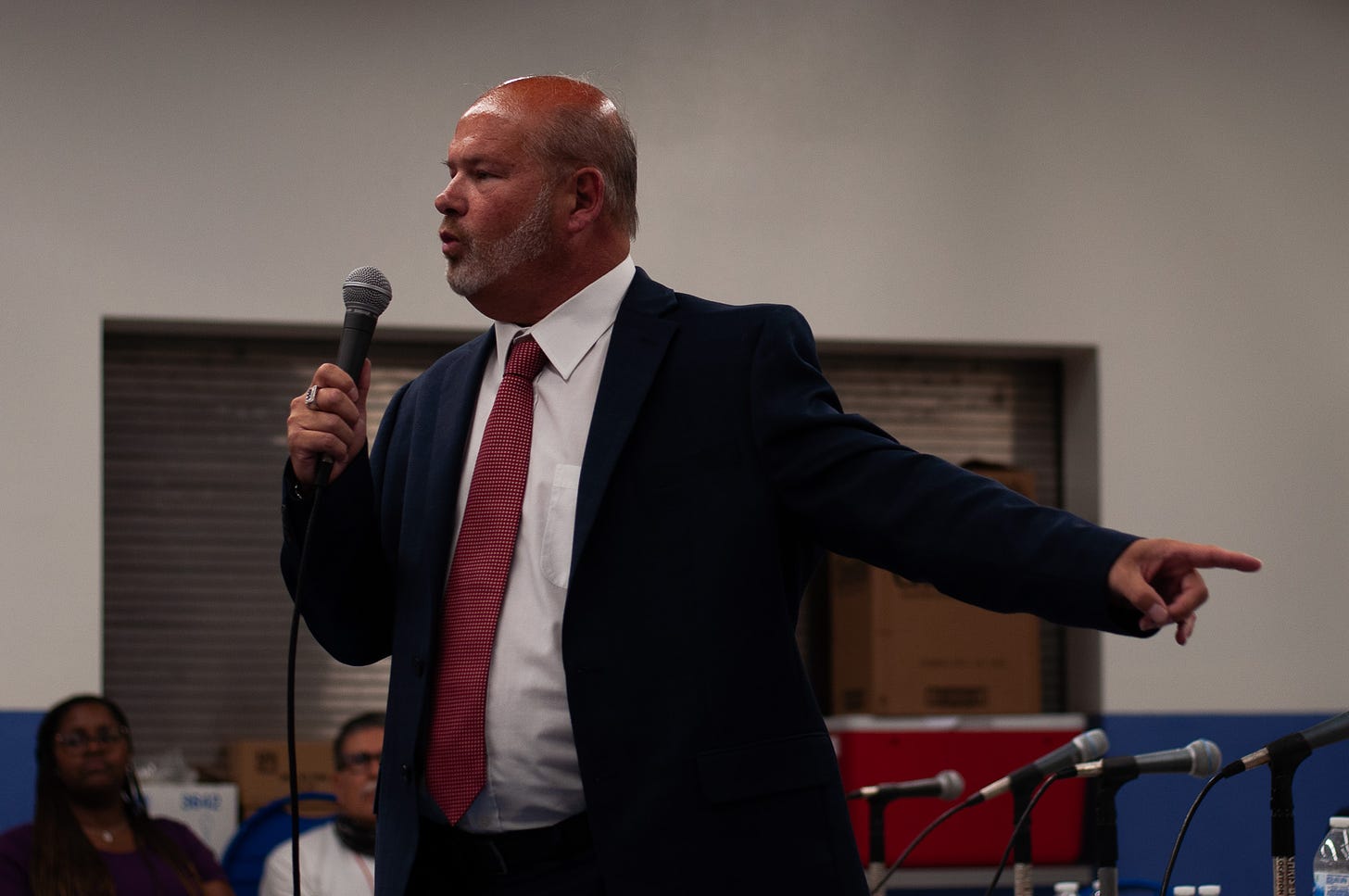
Reversing the trend of department employees breaking the law
Pima County corrections officer Jose Monreal Jr. has been a focal point in this election, after he was arrested in connection with nearly two dozen shoplifting incidents but managed to keep his job.
“Deputies are human, just like you, and they’re going to make mistakes,” Nanos said, defending his decision to go against the department disciplinary panel’s recommendation to fire Monreal. “We’re all innocent until proven guilty, why should a correction officer face a different set of circumstances because of his badge?”
Nanos said Monreal had an untarnished record with the department prior to his arrest and is the sole provider for a disabled child.
Monreal’s continued employment and Nanos’ handling of a sergeant accused of sexual assault by one of his deputies are examples of Nanos’ ego getting in the way, Frederick said, telling the crowd that he’s their “constitutional sheriff.”
The constitutional sheriff ideology is based on the concepts that the county, rather than state or federal governments, should control all the land within its borders and that county sheriffs should be the ultimate law enforcement authority in the U.S., according to the Southern Poverty Law Center Last year, dozens of constitutional sheriffs fought against firearm reform and publicly refused to enforce gun laws.
Lappin called herself a “bleeding-heart Republican,” saying that when public trust is broken by tarnishing the badge, it creates a ripple effect across the community. She said moving towards a quality over quantity approach to hiring will raise the department’s standards.
Phillips said transparency is vital and that while people are human and make mistakes, law enforcement officers are held to a higher standard and people expect them to not break the law.
It’s important for the department to take accountability when a mistake has been made, and that’s not happening with this administration, Rosenthal said. He told the crowd that if he’s elected, he’ll be the first to stand up and say, “we were wrong.”
You can watch the livestream here and stay tuned next week when we break down the county attorney portion of the event.
This story was supported by the Local News Initiative of Southern Arizona, a fund of the Community Foundation for Southern Arizona.
Big-time bucks: The Pima County supervisors approved a $1.7 billion budget on Tuesday, the Arizona Luminaria’s John Washington reports. The county department that saw the biggest funding increase was the Sheriff’s Department, which got $11 million more than it did last year. That includes bumping up funding for the jail, which accounts for about one-third of the department’s total budget. During the public hearing on the budget, Mike Aaron, accused the supervisors of spending money “like drunken sailors.”
Big-time cuts: The new state budget includes cuts to a scholarship program the University of Arizona will have to find a way to fund on its own, along with cuts to a teacher training program, the Arizona Daily Star’s Ellie Wolfe reports. The $8 million in cuts to the UA come as the school already is dealing with a $162 million budget deficit.
Harsh words: Former County Attorney Barbara LaWall didn’t mince words when she called County Attorney Laura Conover “factually unhinged” in an op-ed in the Tucson Sentinel. LaWall offered a rebuttal of Conover’s assertions about the transition that followed Conover’s election in 2020, including Conover saying she didn’t have access to the County Attorney’s Office before she was sworn in and that no one from LaWall’s office talked to Conover about budget details. LaWall already sided publicly with Conover’s opponent in the Democratic primary, Mike Jette, and she urged voters to choose him in her op-ed.
That’s a big battery: A new solar power system near Willcox will help Tucson Electric Power power about 11,000 homes, even after the goes down, the Star’s David Wichner reports. Once the system is up and running in 2027, Winchester Solar will sell energy from its 80-megawatt photovoltaic array to TEP. The system will have an 80-megawatt battery storage system Winchester Solar can charge in the morning and afternoon, and then use that energy during peak use hours.
Charges stick: A federal judge denied an attempt by two Cochise County supervisors to get the charges against them dropped, Arizona Public Media’s Paula Rodriguez reports. Peggy Judd and Tom Crosby asked the judge to dismiss charges of conspiracy and interference with an election officer, which Attorney General Kris Mayes brought after Judd and Corsby delayed the canvass and certification of the 2022 election. They argued the legal doctrine of legislative immunity protected their actions, but the judge disagreed.
The Cochise County Board of Supervisors “does not have the authority to delay the canvass with the single exception being where returns from a polling place are found to be missing, a situation not found here. Canvassing the vote is not a discretionary function,” Judge Geoffrey Fish wrote.
Patagonia’s choices: While voters consider candidates for county offices, Congress, Senate, and the presidency, towns all over Southern Arizona are holding elections this year for their town councils. The Patagonia Regional Times profiles the four candidates for Patagonia Town council: Francesca Claverie, Ron Reibslager, Gary Retherford, and Michael Stabile.
113: The expected high temperature in the Marana area today, according to the National Weather Service.





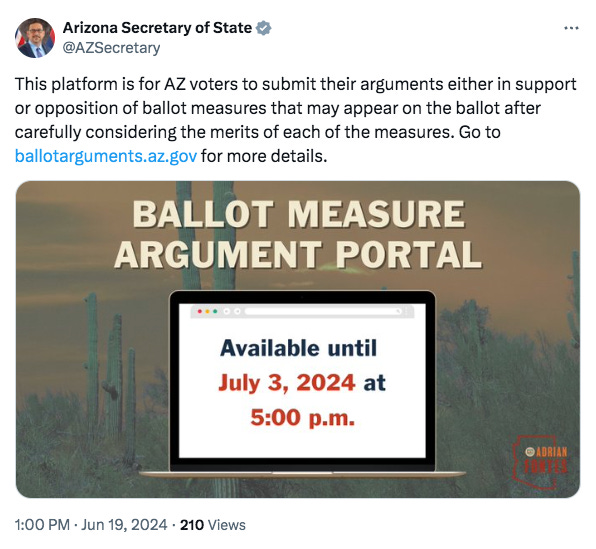

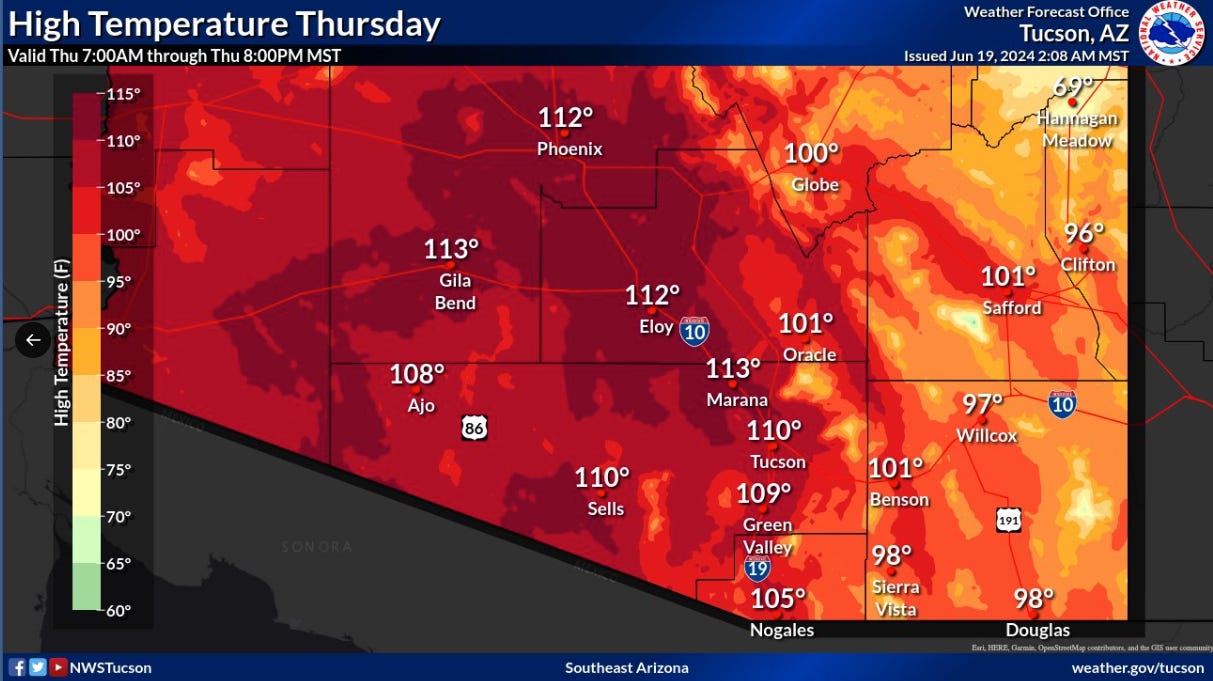
Thanks for covering the NAACP forum. Also ... Barbara LaWall is certainly trying hard to get her "tough-on-crime" cronies back in power. Let's not forget LaWall's record. Go, Laura!